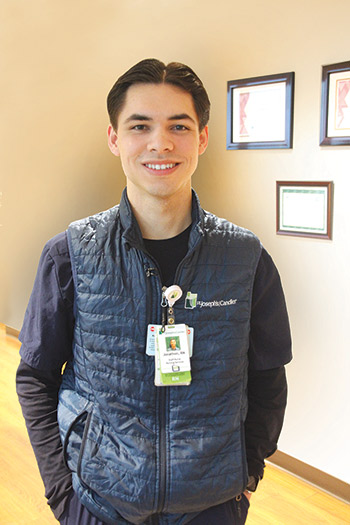Ask A Magnet Nurse
Certified Nurses Provide Special Care In The Neuro ICU
Seth Raney, RN, BSN
Neuro Intensive Care Unit
St. Joseph’s Hospital

Smart Living: An Intensive Care Unit, or ICU, provides critical care to patients with life-threatening conditions. But what is the Neuro-ICU?
Seth Raney: In the Neuro-ICU, we are focused on patients who are cognitively or neurologically compromised. This includes conditions such as ischemic or hemorrhagic strokes, seizures, intracranial hemorrhages, traumatic brain injuries, craniotomies, as well as complicated spinal surgeries. We regularly perform neuro checks, which include tests of sensory function, motor function, range of motion, mental status and more. We also closely monitor vital signs as well as intracranial pressure if needed.
SL: Are nurses here specially trained to detect neurological complications?
SR: Yes, we get re-certified in our Stroke Smart class every two years in order to ensure our knowledge and practice of neurological care is comprehensive. There are other certifications that can be obtained as well such as the CCRN, SCRN, and CNRN national certifications. We also participate in a “neuro boot camp” to ensure we are prepared to identify and handle neurological complications efficiently. We have to anticipate potential complications and be ready to act fast.
SL: Speaking of fast, Neuro-ICU nurses encourage everyone to learn about BE FAST. What is BE FAST?
SR: BE FAST is an acronym that anyone can use to recognize the signs of a stroke. B stands for Balance, indicating sudden loss of balance. E is for Eyes, or vision changes. F stands for Face, noting facial drooping. A is for Arms, highlighting weakness or numbness in one arm. S stands for Speech, indicating slurred speech. Finally, T stands for Time—call 911 immediately if you see any of these symptoms. As we say, “Time is brain.” The sooner you get a stroke patient to the hospital, the better chance they have at recovery.